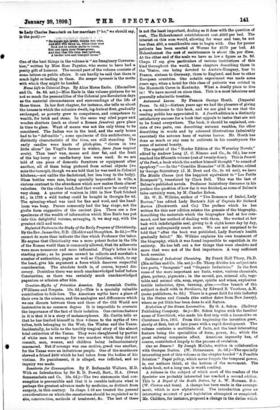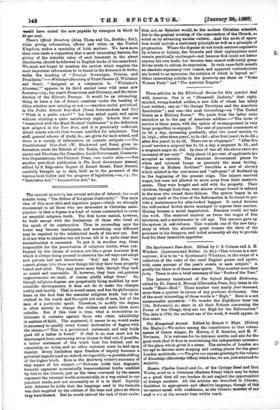Can we Disarm ? By Joseph McCabe, written in collaboration
with Georges Darien. (W. Heinemann. 2s. 6d.)—The specially interesting part of this volume is the chapter headed "A Possible Solution." Papal policy, which never forgets the temporal power, is, our authors think, at the bottom of the movement. The whole book, not a long one, is worth reading.
A volume in the subject of which most of the readers of the Spectator are probably interested has reached a second edition. This is A Digest of the Death Duties, by A. W. Norman, B.A. (W. Clowes and Sons). A change has been made in the arrange- ment, which is now alphabetical. The introduction gives an interesting account of past legislation attempted or completed. Mr. Childers, for instance, proposed a change in the duties which would have raised the rate payable by strangers in blood to 111 per cent.
Thom's Official Directory (Alex. Thom and Co., Dublin ; 21s.), while giving information, official and other, on the United Kingdom, makes a speciality of Irish matters. We have more than once made a suggestion that a most interesting feature, the giving of the rateable value of each tenement in the street directories, should be followed in English books of the same kind. We must not forget to mention the section which supplies the most important information to be found in the Almanach de Gotha, under the heading of " Foreign Sovereigns, Princes, and Presidents."— Whitaker's Directory of Titled Persons (J. Whitaker and Sons), "designed as a companion to • Whitaker's Almanac:" appears in its third annual issue with some new features,—e.g., the year's Promotions and Obituary, and the intro- duction of the Historic Peerage. It would be an interesting thing to have a list of former creations under the heading of titles, whether now existing or not.—Another useful periodical is The Public Schools Year-Book (Swan Sonnenschein and Co.) "What is a public school ?" has been asked again and again without eliciting a quite satisfactory reply. Schools that are "connected with the Head-Masters' Conference" is the definition now adopted in the Year Book, and it is practically sufficient. About ninety schools thus become qualified for admission. The staff, general scheme of study, &c., are given for each school, and there is a variety of information on cognate subjects.—The Constitutional Year-Book W. Blackwood and Sons) gives in- formation about the Estates of the Realm, Parliament, Constitu- encies and Elections, the Franchise, Local Government, Conserva- tive Organisations, the Unionist Press, cum miatis atiis.—Yet another periodical publication is The Local Government Annual, edited by S. Edgcumbe Rogers (2 Dorset Street, Fleet Street), carefully brought up to date, both as to the personnel of the various local bodies and the progress of legislation,—as, e.g., the "Inebriates Act," " Locomotives Act," &c.



















































 Previous page
Previous page